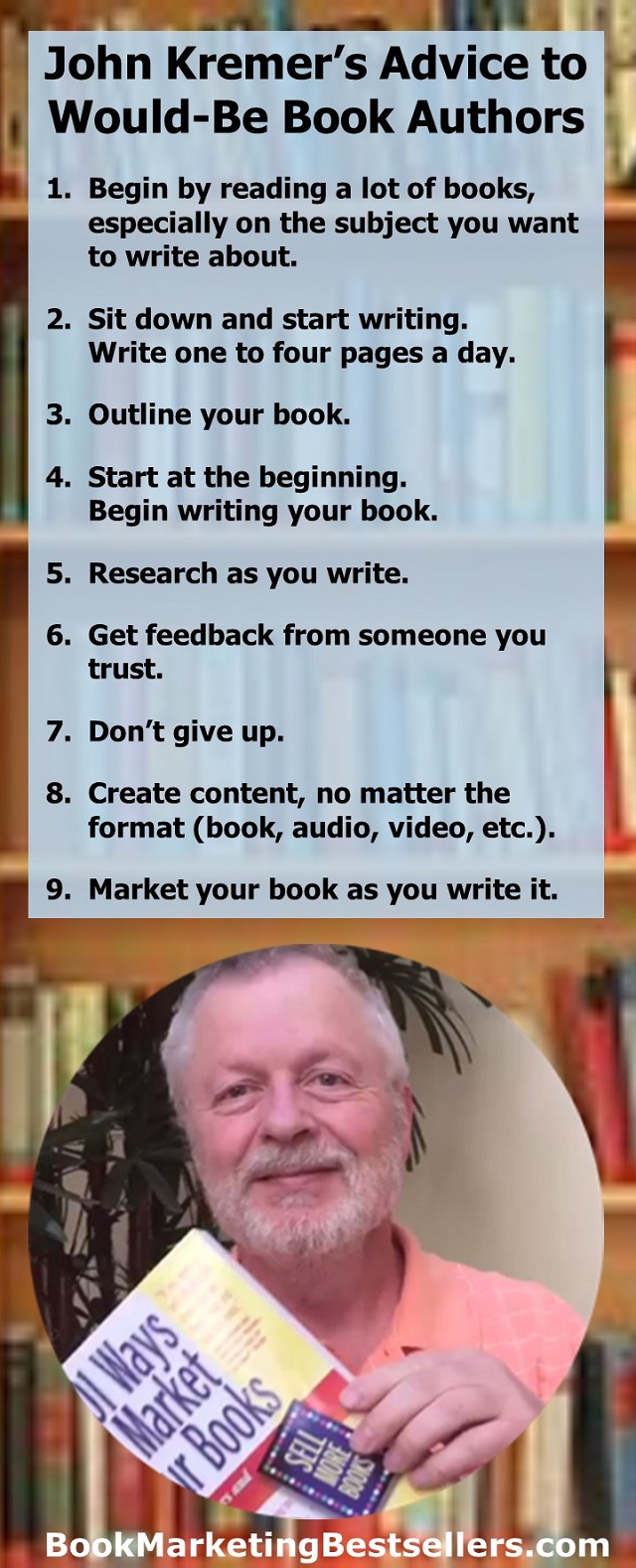For authors who want to write a book but do not yet know how to go about it and don’t quite know how to get started — the desire is enough. If you have a passion for your topic and for your book, you can write a book. Start simply.

1. Begin by reading a lot of books on the subject you want to write about. Get educated. Discover what others have written so you can make your book better, different, or more targeted.
If you are writing a novel, then read good novels in your genre (romance, mysteries, fantasy, etc.). Read some of the classics as well as some more recent fiction. Get to know the history and current style of the genre you want to write.
Similarly, if you are working on a nonfiction book, read bestselling or highly recommended books on your specific topic. Again, read some classics as well as some more recent books.
Take notes as you read. Highlight books you own. Tear out pages and place in folders to refer back to later when you start writing. Jot down ideas as books inspire your own thoughts. The books you read should inspire the content for your book. Be sure as you read to consider how you might make the book you write even better than the one you are reading.
2. Sit down and start writing. Write one to four pages a day. Don’t worry about how good it is. Just get started writing. Do this before you do step 3.
3. Outline your book. Once you’ve gotten a week or two worth of writing collected, begin to outline how you want to write your book. If nonfiction, outline the chapters or step-by-step description you want to focus on. If fiction, develop and outline your plot, setting, and major characters.
4. Start at the beginning. Once you have an idea of the whole shape of your book (chapter by chapter outline or a plot), now begin writing your book. Start at the beginning of the book for fiction. For nonfiction, you can write the introduction later; start with the nuts and bolts content for your book. Write something every day. Set aside some time to write.
5. Research as you write. If you find as you write your book that you need to do some more research, do that now. Then go back to writing.
6. Get feedback from someone you trust, someone who will not criticize your work but who can give you honest feedback about your writing style as well as the content of your book.
7. Don’t give up. If you write four pages a day, you’ll have a book in less than six months. If you write five pages a week, you’ll have a book within a year.
8. Create content, no matter the format. If you can’t write a book despite all this advice, then create a tape, do a video, write a blog, create a new website, interview others. Get your content and inspiration out somehow. You can always write a book later.
9. Begin marketing at step 1. As you research and write your book, begin your marketing process. Set up a blog for your topic (with a great URL).
Create a Facebook fan page, a Pinterest board or twenty, a Twitter profile, a few YouTube videos, etc. Start commenting on other related blogs and websites. Retweet key thought leaders on your topic. Like, share, and comment on their Facebook posts. Repin their pins. Create graphic quotes from their work and share on your blog and social networks.
Interview your favorite authors: teleseminar, podcast, Internet radio show, Google Hangout, Skype recording. Then share on your blog.
There are tons of ways to begin connecting with the top writers on your topic so when you are ready to publish your book, you’ll already have built up relationships with the people who can really praise and share your book.
Of course, as you do all this marketing, be sure to collect names and email addresses. Build your list. Give them something of value every week via a newsletter that shares what you are learning as you do research and share what you are creating as you write.
That’s how you build the pre-publication excitement for your book — and the fan base that will boost your book to bestseller status within weeks.
That’s my short answer.
About John Kremer
John Kremer is author of 1001 Ways to Market Your Books, the Relationships Matter Marketing program, and many other books and reports on book marketing, Internet marketing, social media, and book publicity. -- John Kremer on Book Marketing.

